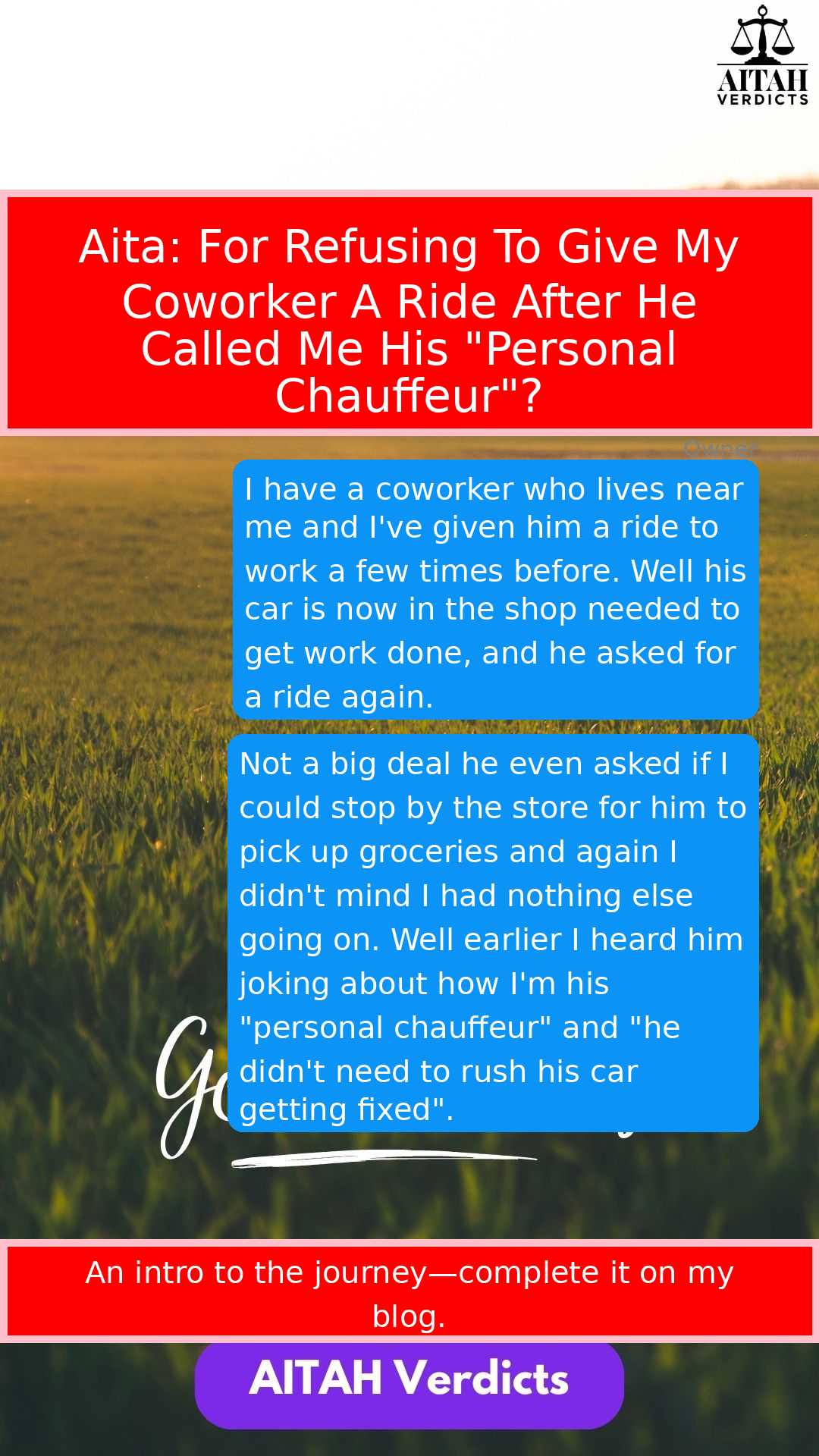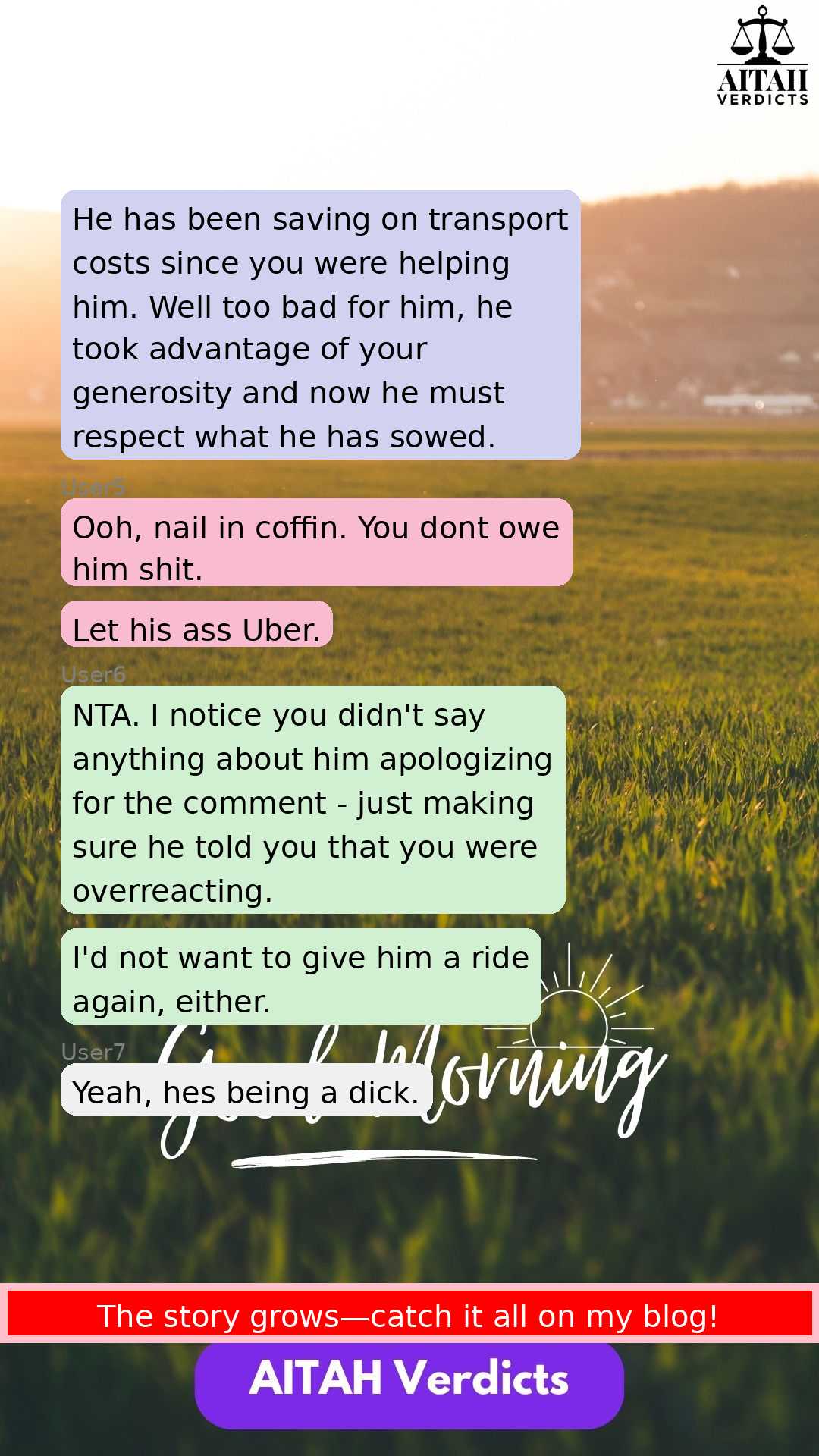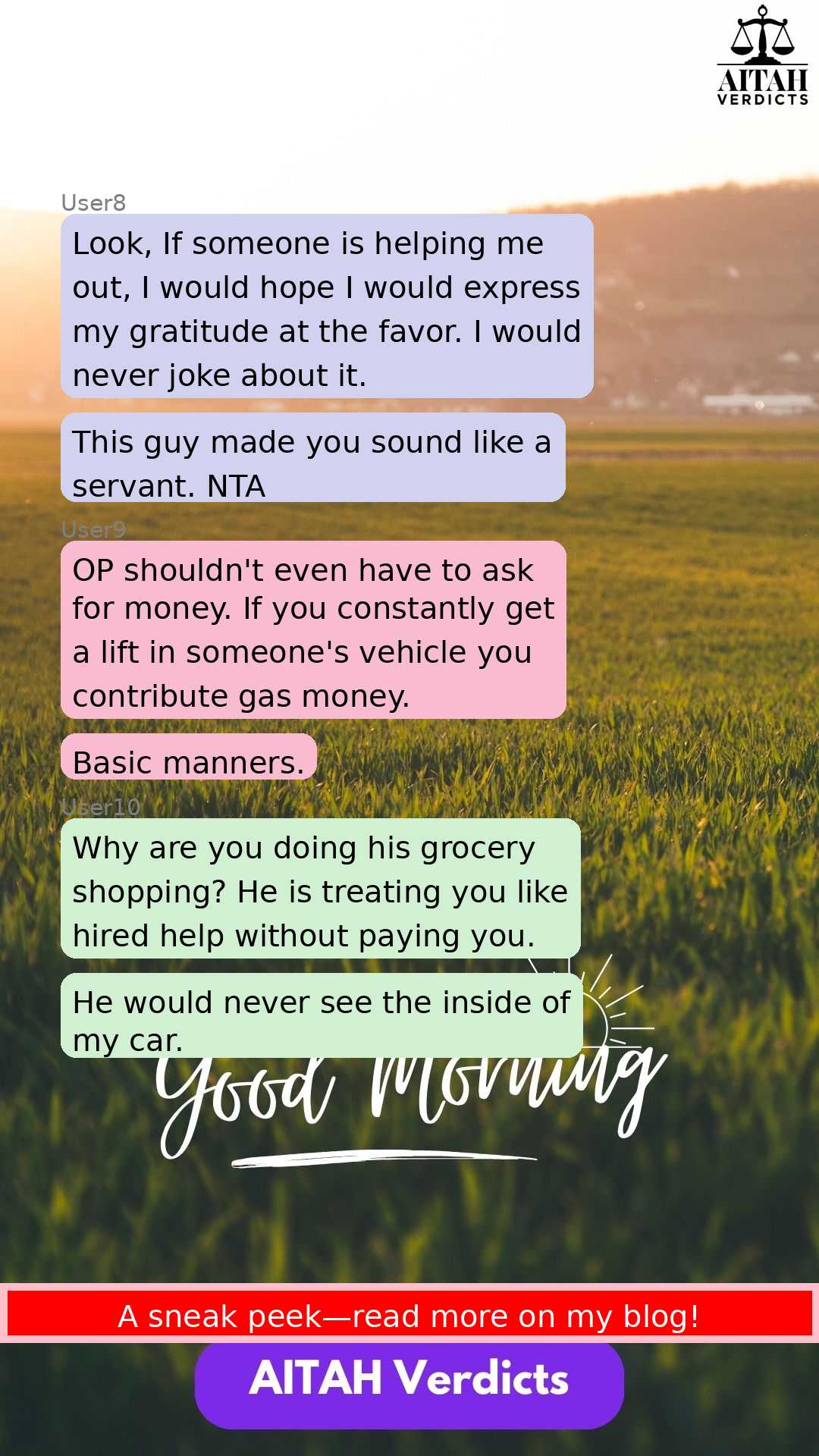AITA: for refusing to give my coworker a ride after he called me his “personal chauffeur”?
 Image credit: Pixabay (This is example image – Not the actual photo)
Image credit: Pixabay (This is example image – Not the actual photo)
AITA for Refusing to Be My Coworker’s “Personal Chauffeur“?
After offering a few rides to a coworker whose car is in the shop, I overheard him jokingly refer to me as his “personal chauffeur.” When he asked for another ride after work, I declined, feeling his comments crossed a line. Now, he’s claiming I’m overreacting, but I can’t shake the feeling that his humor was disrespectful. This situation raises questions about boundaries and the expectations we set in friendships and work relationships.
Conflict Over Rides: A Workplace Dilemma
In a recent situation involving a coworker, a conflict arose that highlights the complexities of workplace relationships and the potential for family drama. The following points outline the events that transpired:
- Background: The narrator has a coworker who lives nearby and has previously received rides to work on several occasions.
- Current Situation: The coworker’s car is in the shop for repairs, prompting him to request another ride.
- Additional Request: Along with the ride, the coworker asked if the narrator could stop by a store to pick up groceries, which the narrator agreed to without hesitation.
- Joking Remarks: During a conversation, the coworker made light-hearted comments about the narrator being his “personal chauffeur” and suggested he didn’t need to rush getting his car fixed.
- Response to Jokes: Upon hearing these remarks, the narrator felt uncomfortable and decided to decline the coworker’s request for a ride after work.
- Confrontation: When the coworker was informed of the decision, he reacted by saying the narrator was overreacting and that his comments were merely jokes.
- Outcome: The coworker ended up having to pay for an Uber to get home, leading to further reflection on the situation.
This incident raises questions about boundaries and the nature of joking in professional relationships. The narrator is left wondering if their reaction was justified or if they misinterpreted the coworker’s intentions. The situation illustrates the potential for misunderstanding in workplace dynamics, especially when humor is involved.
In terms of conflict resolution, it may be beneficial for the narrator to have an open conversation with the coworker to clarify feelings and expectations moving forward. Establishing clear boundaries can help prevent similar situations in the future and maintain a positive working relationship.
Ultimately, this scenario serves as a reminder of the delicate balance between helping colleagues and ensuring that personal boundaries are respected, especially in the context of family drama and workplace interactions.
This is Original story from Reddit
 Image credit: Pixabay (This is example image – Not the actual photo)
Image credit: Pixabay (This is example image – Not the actual photo)
Story
I have a coworker who lives near me, and I’ve given him a ride to work a few times before. Well, his car is now in the shop needing work done, and he asked for a ride again. Not a big deal; he even asked if I could stop by the store for him to pick up groceries, and again I didn’t mind as I had nothing else going on.
Well, earlier I heard him joking about how I’m his “personal chauffeur” and that “he didn’t need to rush his car getting fixed.” He asked me for a ride again today after work, and I told him no, bringing up what I heard him say. He said I’m overreacting and that he was just kidding.
I didn’t give him a ride home, and he had to pay for an Uber. Am I an asshole for not giving him a ride home? Or was his “joking” as rude as I took it?
View the Original Reddit Post Here
Summary of Reddit Comments
The top Reddit comments reveal a strong consensus around NTA due to the user’s friend making inappropriate jokes about being a “personal chauffeur” and taking advantage of their kindness. Most users agree that the friend should be more considerate and contribute to transportation costs, highlighting the importance of gratitude and respect in friendships.
Overall Verdict
NTA
Expert Advice for Resolving the Conflict
In navigating workplace relationships, especially when humor and personal boundaries are involved, it’s essential to approach the situation with empathy and clarity. Here are practical steps for both the narrator and the coworker to resolve the conflict and improve their working relationship:
For the Narrator
- Reflect on Your Feelings: Take some time to understand why the coworker’s jokes made you uncomfortable. Acknowledge your feelings and recognize that it’s okay to set boundaries.
- Initiate a Conversation: Approach your coworker for a private discussion. Choose a neutral setting where both of you can speak openly without distractions.
- Express Your Perspective: Share how the jokes made you feel. Use “I” statements, such as “I felt uncomfortable when you joked about me being your personal chauffeur.” This helps to avoid sounding accusatory.
- Set Clear Boundaries: Clearly communicate your limits regarding rides and assistance. Let your coworker know that while you are willing to help, you also have your own commitments and boundaries.
- Encourage Mutual Respect: Emphasize the importance of gratitude and respect in your relationship. Suggest that both of you should be considerate of each other’s time and efforts moving forward.
For the Coworker
- Listen Actively: When the narrator expresses their feelings, listen without interrupting. Acknowledge their perspective and validate their feelings, even if you intended the jokes to be light-hearted.
- Apologize if Necessary: If you recognize that your comments may have crossed a line, offer a sincere apology. Acknowledging your mistake can go a long way in mending the relationship.
- Be Mindful of Humor: Understand that humor can be subjective, especially in a professional setting. Consider how your jokes may be perceived by others and adjust your approach accordingly.
- Show Appreciation: If the narrator agrees to help you in the future, express gratitude for their assistance. Small gestures of appreciation can strengthen your working relationship.
- Consider Alternatives: If you find yourself needing rides frequently, explore other transportation options, such as public transit or carpooling with others, to reduce reliance on the narrator.
Conclusion
By taking these steps, both the narrator and the coworker can work towards a more respectful and understanding relationship. Open communication and mutual respect are key to resolving conflicts and maintaining a positive workplace environment.
Join the Discussion
 Image credit: Pixabay (This is example image – Not the actual photo)
Image credit: Pixabay (This is example image – Not the actual photo)
What do you think? Would you have handled this differently?
Share your thoughts below! Vote: Do you agree with Reddit’s verdict?








